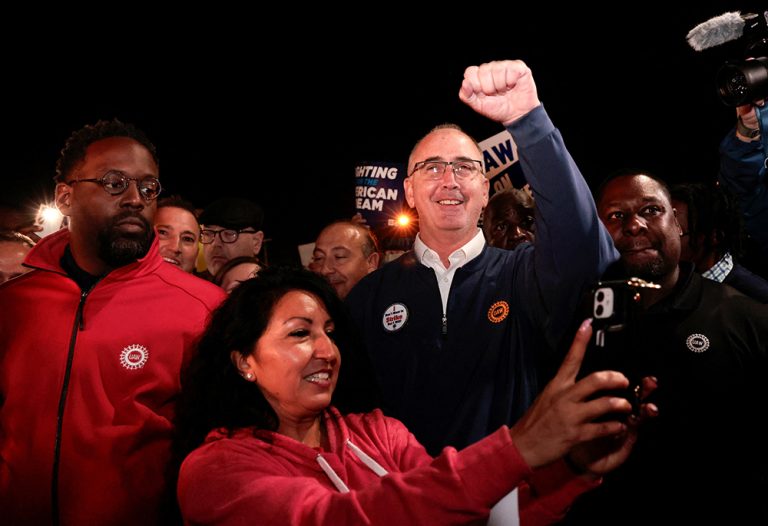CNN published a report by John Blake last week about United Auto Workers leader Shawn Fain and how he was deeply influenced by his faith. The article gave a brief history of Social Gospel and seemed somewhat surprised that there was still a left-wing iteration of the Christian faith. This reminded me of the title the Washington Post gave to an article in 2008: “The religious left? Nothing is sacred?!“I remember this title well. Click on it and you will understand why!
The ambivalent situation of the Christian left is another story for another day. But there were two interesting things about the CNN story. Firstly, there was a complete absence of any information about the history of the Catholic Church with the labor movement and, secondly, the failure to understand why the labor movement and the Christian faith were natural partners. Maybe supernatural partners too.
Blake only mentions one Catholic in his article, Dom Hélder Câmara, whom Blake incorrectly identifies as a “Brazilian theologian” when he was archbishop. It is also strange that Blake forgot to mention Walter Rauschenbusch who was the leading theorist of the Social Gospel movement in the 19th century. But while our Protestant brothers and sisters were birthing their Social Gospel movement, Roman Catholics were busy creating unions. The Knights of Laboralthough founded by a Quaker, rose to prominence under the leadership of a lay Catholic, Terrence Powderly.
The Knights of Labor had to hold their meetings in secret because employers were keen to expel their members from their factories. At this time, “secret societies” were still a great source of concern for the Vatican, primarily because of Freemasonry. (Apparently, this is still a concern at the Vatican!) At the instigation of Canadian Cardinal Elzéar-Alexandre Taschereau, Archbishop of Quebec, the Holy See condemned the Knights of Labor like a secret organization.
American Cardinal James Gibbons, however, wrote a memorial letter to the Vatican, demanding that the ban be lifted. The Cardinal of Baltimore also wrote a letter to the Knights, to be read at their congress, in the hope of increasing their numbers. Ultimately, the Vatican declared that membership in the Knights could be tolerated, but the proto-union was already in decline. The much more significant consequence of this back and forth was the effect on the thinking of Pope Leo XIII who, in 1891, wrote the Magna Carta for Catholic social teaching: Rerum Novarum.
Throughout the 20th century, worker priests were active, bringing Catholic social teaching to rank-and-file workers. Mgr. George Higgins’ long service as chaplain to the AFL-CIO was honored last year with a panel and a special mass. Popes continued to teach on the right to organize. American bishops filed an amicus brief support the right to organize in the Janus v. AFSCME In this matter, bishops often play a key role in defeating anti-union laws, as happened in New Hampshire in 2021.
Why does it make sense that organized labor arose within Christianity in this country? It is true that Protestantism and the Enlightenment introduced a strongly individualist and subjectivist understanding of the claims of the Christian faith. But a simple reading of the Hebrew and Christian scripture texts highlights a more communal understanding of ethics and belief.
Ancient Israel was, for all intents and purposes, a theocracy. God’s law dictated the organization of Israelite society and set out prescriptions and prohibitions for both individuals and society. Only modern and poorly informed exegetes, people like House Speaker Mike Johnson, consider that Yahweh’s commandments to care for the widow and the orphan, to welcome the stranger, and to leave crops to the poor, were invitations to personal charity. They were laws for society as Mark Silk explained at the Religious Press Service.
Christ preached a demanding ethic of personal conversion but he also proclaimed the reign of God. Not only did he uphold the law of Moses, but he commanded his apostles to preach the gospel to all nations. As Cardinal Joseph Ratzinger of the time said in the introduction to the 1988 edition of Henri de Lubac’s work Catholicism: Christ and the common destiny of man: “The idea of community and universality…permeates and shapes all the individual elements of Faith’s content.”
So when highly religious 19th-century workers looked for metaphors and ideas about the solidarity they knew they would need to successfully organize into unions, it was only natural that they would turn to the same verses and ideas that shaped the social gospel and Catholic social teaching at the time shaped Shawn Fain and millions of religious progressives today. There is no group in American society with whom it is easier to share a conversation about Catholic social teaching than the leaders of the American labor movement. In my experience, concepts drawn from papal teaching are always received at first glance among workers. They understand. They live.
No one should have been surprised to learn of Fain’s faith. As the labor movement finds new strength and support in American society, leaders of the Catholic Church, religious and secular, would do well to stand arm in arm with unions. Fighting together for a more just society is our heritage and our hope.


